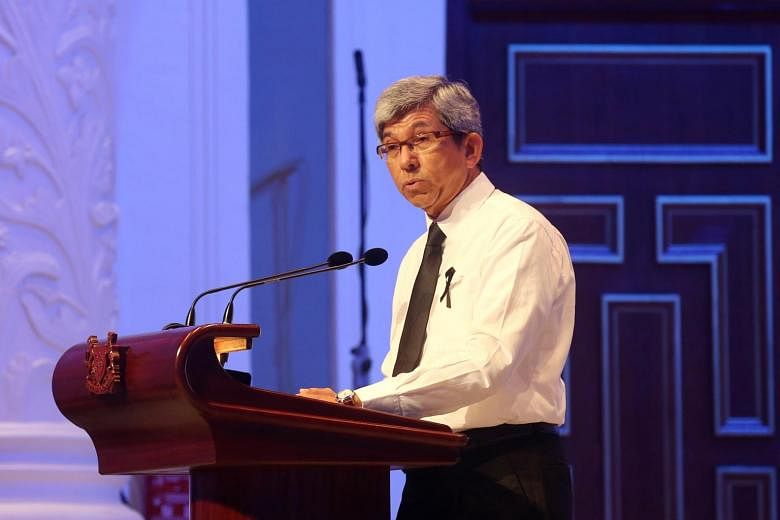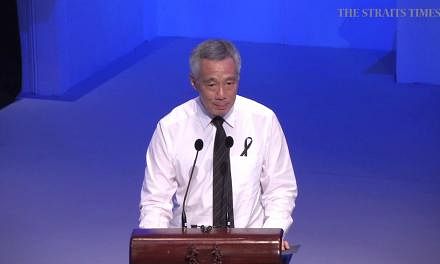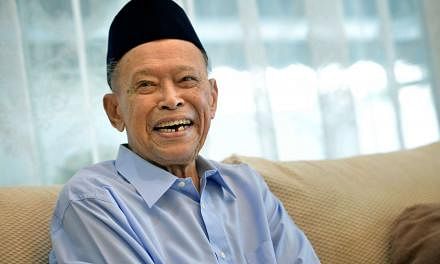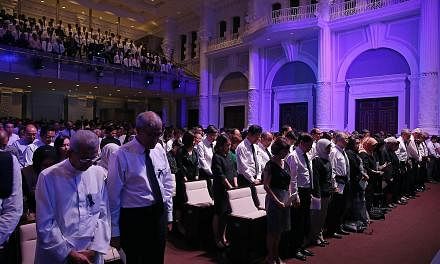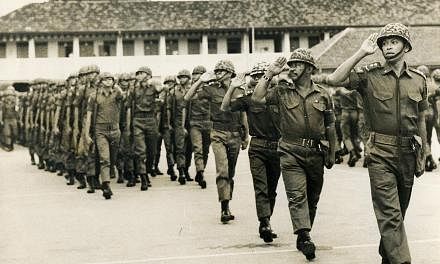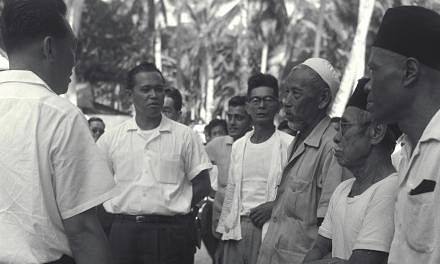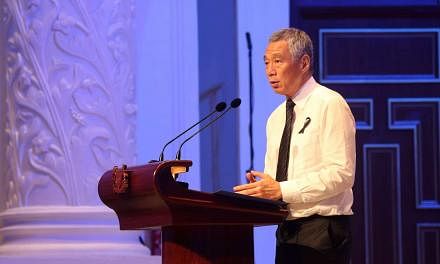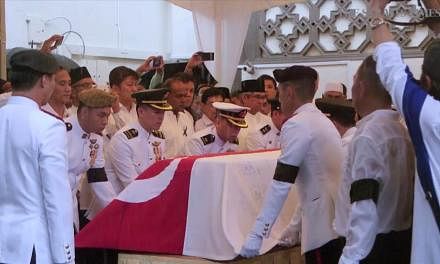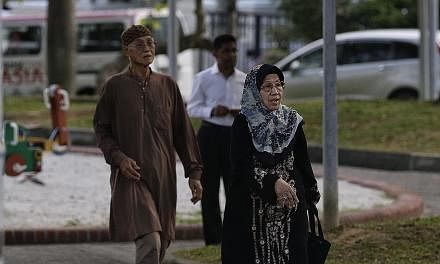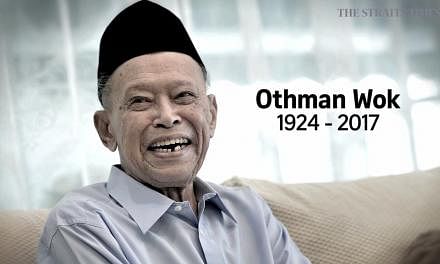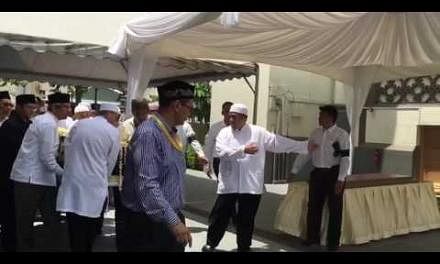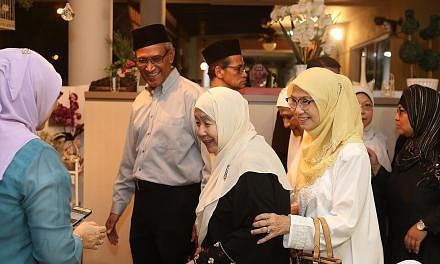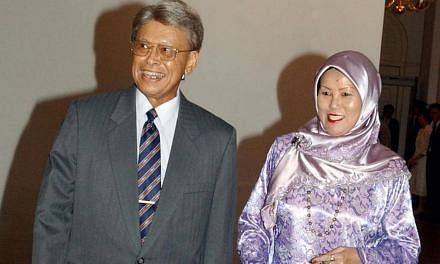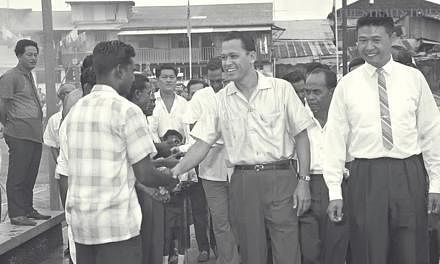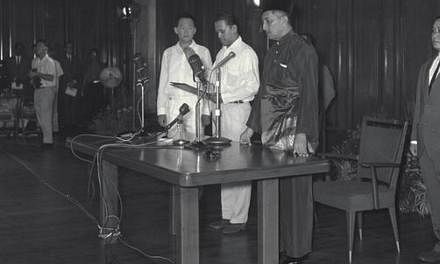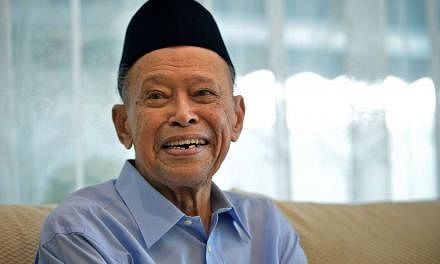The ethos of multiracialism espoused by Mr Othman Wok is even more important today, with extreme ideologies proliferating on many fronts, said Minister for Communications and Information Yaacob Ibrahim yesterday.
In such a climate, there is a greater need for "courageous souls" like Mr Othman to speak up for diversity, Dr Yaacob added in his eulogy for the pioneer minister, who died on Monday at age 92.
Speaking at a memorial service for Mr Othman, he said: "The battle for respect, trust and mutual understanding is won, and will always be won, when men like Othman Wok fight with sheer passion and conviction against any force that seeks to divide us."
Men like him do not use violence but stand their ground "with the spirit of empathy and respect for their fellow men", he added. "They will forever be our models and beacons for a better future."
Mr Othman's role in uniting a nation that could have fractured along racial lines was highlighted yesterday in the eulogies of both Dr Yaacob and Minister of State Janil Puthucheary.
Reflecting on Mr Othman's steadfast belief in multiracialism, Dr Yaacob said it stemmed from his life experiences. As "an ordinary clerk thrust into public life", he faced difficult choices at a time when Singapore was forging its own identity amid its newfound independence.
"He could have been part of a society where he would be comfortable as part of the privileged majority, never mind that the minorities would feel less than welcome."
Instead, Mr Othman chose to be part of a new nation "founded on the principles of multiracialism, where everyone would have equal opportunities to succeed".
Mr Othman had made his choice when he joined the People's Action Party in 1954, Dr Yaacob said.
He had "kept his faith" with the party's model for a diverse society in the years before Singapore's independence in 1965, despite "economic survival, racial riots, chauvinistic elements pulling constantly at the hearts and minds of our Malay community", he added.
As a minister, Mr Othman also saw sports as a "powerful unifying force" that transcended race, language and religion, and had worked hard to establish some of Singapore's sporting institutions.
"I can only imagine Encik Othman's satisfaction when he saw Singaporeans cheering on Team Singapore as one during the Olympics and Paralympics last year, and the SEA Games and Asean Para Games the year before."
Dr Janil in his eulogy said Mr Othman had sown the seeds for "an approach to building a shared space built on compromise and sacrifice".
Dr Janil, who is chairman of racial harmony advocacy group OnePeople.sg, said this "untried, difficult, challenging" approach of Singapore's pioneer leaders was "quite unlike anything that had been attempted in history".
It required sacrifice from all communities and races, who had to recognise their differences and work to overcome them.
"All our people sacrificed something, majority and minorities alike together - language, religious practice, dress codes, social customs, aspects of education. We were all prepared to give up something for the greater good," said Dr Janil.
"We developed a consciousness that in matters of racial harmony, giving was better than taking, sacrifice and compromise were better than winning."
Another legacy of Mr Othman and the pioneer leaders was that "we do not have to accept the world as it is".
At a time when kampungs were racially segregated, and jobs and education were available to only certain groups, "it is remarkable for a handful of people to believe that their ideas could heal and shape the entire nation", said Dr Janil.
To look at people of different faiths, ideals and religions and "find the common shared vision... some common humanity and to make the choice to stand with them... this is a different type of courage".
Dr Yaacob, who is also Minister-in-charge of Muslim Affairs, said that as a national leader, Mr Othman helped forge a multiracial Singapore, and as a leader of the Malay-Muslim community, he had also made lasting contributions.
He cited as an example Mr Othman's part in introducing the Administration of Muslim Law Act.
"Encik Othman may have left us, but we must always remember that he has left his legacy about what this nation, our Singapore, stands for - courage, conviction and a deep- seated commitment to the ideal of multiracialism," he said.
